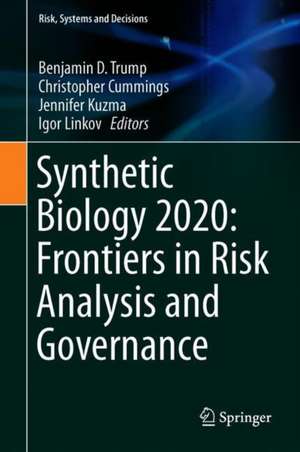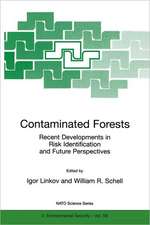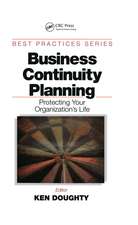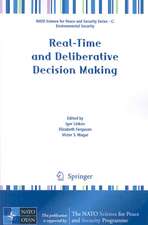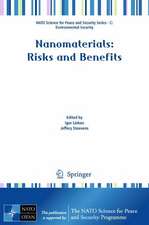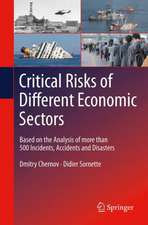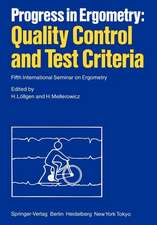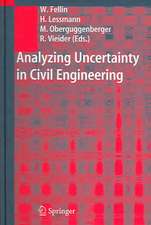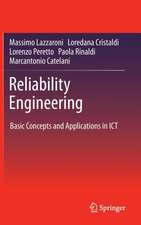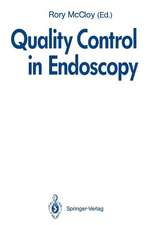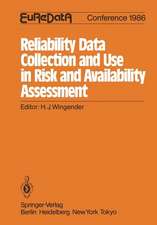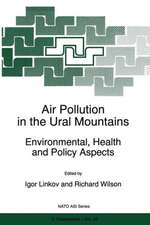Synthetic Biology 2020: Frontiers in Risk Analysis and Governance: Risk, Systems and Decisions
Editat de Benjamin D. Trump, Christopher L. Cummings, Jennifer Kuzma, Igor Linkoven Limba Engleză Hardback – 11 dec 2019
Contributing authors in this volume represent diverse perspectives related to synthetic biology’s social sciences, and reflect on different areas of risk analysis and governance that have developed for the field. Such perspectives include leading scholarly discussion pertaining to risk assessment, governance, ethics, and communication. The chapters of thisvolume note that while the first twenty years of synthetic biology development have focused strongly on technological innovation and product development, the next twenty should emphasize the synergy between developers, policymakers, and publics to generate the most beneficial, well governed, and transparent technologies and products possible.Many chapters in this volume provide new data and approaches that demonstrate the feasibility for multi-stakeholder efforts involving policymakers, regulators, industrial developers, workers, experts, and societal representatives to share responsibilities in the production of effective and acceptable governance in the face of uncertain risk probabilities. A full consideration of such perspectives may prevent a world of draconian regulations based on an insufficient or incomplete understanding of the science that underpins synthetic biology, as well as any hesitancy or fear by the public to adopt its eventual products.
| Toate formatele și edițiile | Preț | Express |
|---|---|---|
| Paperback (1) | 733.78 lei 6-8 săpt. | |
| Springer International Publishing – 9 ian 2021 | 733.78 lei 6-8 săpt. | |
| Hardback (1) | 1120.18 lei 6-8 săpt. | |
| Springer International Publishing – 11 dec 2019 | 1120.18 lei 6-8 săpt. |
Preț: 1120.18 lei
Preț vechi: 1366.08 lei
-18% Nou
Puncte Express: 1680
Preț estimativ în valută:
214.37€ • 232.78$ • 180.07£
214.37€ • 232.78$ • 180.07£
Carte tipărită la comandă
Livrare economică 22 aprilie-06 mai
Preluare comenzi: 021 569.72.76
Specificații
ISBN-13: 9783030272630
ISBN-10: 303027263X
Ilustrații: XXV, 421 p. 55 illus., 37 illus. in color.
Dimensiuni: 155 x 235 mm
Greutate: 0.77 kg
Ediția:1st ed. 2020
Editura: Springer International Publishing
Colecția Springer
Seria Risk, Systems and Decisions
Locul publicării:Cham, Switzerland
ISBN-10: 303027263X
Ilustrații: XXV, 421 p. 55 illus., 37 illus. in color.
Dimensiuni: 155 x 235 mm
Greutate: 0.77 kg
Ediția:1st ed. 2020
Editura: Springer International Publishing
Colecția Springer
Seria Risk, Systems and Decisions
Locul publicării:Cham, Switzerland
Cuprins
Preface.- Introduction to Synthetic Biology Risk Governance and Practice.- Section 1: Communities of Practice.- 2: History of Synthetic Biology Research and Scientific Practice.- 3: DIY Community, Biosafety, and Codes of Conduct.- 4: SynBio Research Labs in the Army Corps of Engineers.- Section 2: Examples of Scientific Practice.- 5: Research and Applications of Gene Drive Technology.- 6: Synthetic Biology, Digital Technologies, and Biohacking.- 7: Synthetic Biology experimental research – biomimicry.- 8: Biosafety Research for SynBio Applications in USACE Labs.- Section 3: Risk Analysis Tools.- 9: Applications of Bayesian Networks to identify SB research needs and uncertainties.- 10: Societal Risk Evaluation Scheme: Early Screening and Prioritizing for Anticipatory Risk Governance.- 11: Synbio – decision tools to drive governance and decision making.- 12: Challenges of SynBio Risk Management in LCA and other fields.- 13: Methods for Predicting Exposures to Products and Byproducts of Synthetic Biology.- 14: Solution-focused risk assessment for synthetic biology applications.- Section 4: Regulation and Governance.- 15: Comparative Analysis of Regulatory Variations for SynBio - Applications of Risk Culture.- 16: Adaptive & Anticipatory Governance.- 17: Synbio Regulatory lag and pacing problems.- 18: Synthetic biology governance via existing and prospective legal instruments (tentative).- Section 5: Risk Communication and Engagement.- 19: Risk Communication, Gene Drives, and the Zika Virus.- 20: Engagement with publics under uncertainty.- 21: Inclusion and Public Engagement in Synthetic Biology: A component of Responsible Innovation.- 22: Biotethical Implications of Synthetic Biology and Emerging.- 23: Discussion/Conclusion.
Notă biografică
Dr. Benjamin D. TRUMP is a Research Social Scientist for the US Army Engineer Research and Development Center. Dr. Trump’s work focuses on decision making and governance of activities under significant uncertainty, such as emerging and enabling technologies (synthetic biology, nanotechnology) and developing organizational, infrastructural, social, and informational resilience against systemic threats to complex interconnected systems. Dr. Trump served as a delegate to assist US presence in OECD’s Global Science Forum in 2017, and is the President of the Society for Risk Analysis’ Decision Analysis and Risk Specialty Group in 2018-2019. He was selected as a Fellow of the Emerging Leaders in Biosecurity Initiative (ELBI), Class of 2019. Dr. Trump was also a contributing author of the International Risk Governance Council’s Guidelines for the Governance of Systemic Risks, as well as their 2nd Volume of the Resource Guide on Resilience. Dr. Trump is also frequently active with several Advanced Research Workshops for the North Atlantic Treaty Organization’s Science for Peace Programme, including his role as a Program Committee Lead for a workshop on Biosecurity for Synthetic Biology and Emerging Biotechnologies. Dr. Trump received his Ph.D. from the University of Michigan’s School of Public Health, Department of Health Management and Policy in 2016. He received an M.S. (2012) in Public Policy and Management and a B.S. in Political Science (2011) from Carnegie Mellon University, and completed his postdoctoral training at the University of Lisbon, Portugal.
Dr. Christopher L. CUMMINGS serves as an Assistant Professor of Strategic Communication at Nanyang Technological University, Singapore—a top ranked university in Asia and among the top 15 in the world. He is the Director of the International Strategic Communication Management program and has served in multiple leadership positions within the Society for Risk Analysis. Dr. Cummings’ work focuses on advancing public engagement with science, developing risk communication theory, and improving public health decision-making across the lifespan. An experienced social scientist and communication campaign scholar, Dr. Cummings uses a variety of quantitative, qualitative, and mixed-methods and his work has been featured in applied science and health venues including the Journal of Risk Research, Regulation and Governance, Nanotoxicology, PLOS One, Science, Technology & Human Values, and Climate Research among others. Outside of academia, Dr. Cummings also consults with multiple government agencies across Asia-Pacific on health risk communication issues including dengue fever surveillance and response (Sri Lanka and Singapore), obesity and nutrition access (New Zealand), vaccine communication (Singapore, Australia, and United States), and public engagement with nanotechnology, synthetic biology, and geoengineering (Australia, United States, and Singapore). He also consults privately with various Fortune 500 companies on leadership training, strategic planning, and risk communication initiatives. He completed his B.A. in Communication Studies (California State University, Chico), his M.S. in Communication and PhD in Communication, Rhetoric, and Digital Media (North Carolina State University), and his postdoctoral work under supervision of Dr. Jennifer Kuzma at the Genetic Engineering and Society Center (North Carolina State University).
Dr. Jennifer KUZMA is the Goodnight-NC GSK Foundation Distinguished Professor in the School of Public and International Affairs, and co-founder and co-director of the Genetic Engineering and Society (GES) Center (research.ncsu.edu/ges), at NC State University. Prior to her current position, she was associate professor of at the Humphrey School of Public Affairs, University of Minnesota (2003-2013); study director for several NASEM reports related to biotechnology governance and bioterrorism (1999-2003); and an AAAS Risk Policy Fellow at the USDA (1997-1998). She has over 120 scholarly publications on emerging technologies, risk analysis, and governance including 4 articles in Science and Nature in the past 3 years. Kuzma served as a member of the WEF Global Futures Council on Technology, Values and Policy; the NASEM Committee on Preparing for Future Biotechnology; the FDA Blood Products Advisory Committee; and the UN WHO-FAO Expert Group for Agrifood Nanotechnologies; and as SRA Secretary and Council member. She currently serves on the AAAS-ABA National Council of Scientists and Lawyers. She received the SRA Sigma Xi Distinguished Lecturer Award for her contributions to the field of risk analysis; was elected a Fellow of AAAS in 2018 for distinguished work in anticipatory governance of new technologies; and was awarded the Fulbright Canada Visiting Research Chair in Science Policy in 2017. She appears frequently in the media for her expertise in biotechnology policy, including the New York Times, Science, Nature, NPR, Washington Post, Scientific American, PBS Nova, Wired, and ABC & NBC News. She obtained her Ph.D. in biochemistry from the U of CO Boulder in 1995 where she discovered bacterial isoprene production and was awarded the first patent for methods of bioisoprene production. Her postdoctoral work at the Rockefeller University on plant drought and salinity tolerance led to an article in the journal Science in 1997.
Dr. Igor LINKOV is the Risk and Decision Science Focus Area Lead with the US Army Engineer Research and Development Center, and an Adjunct Professor with Carnegie Mellon University. Dr. Linkov has managed multiple risk and resilience assessments and management projects in many application domains, including cybersecurity, transportation, supply chain, homeland security and defense, and critical infrastructure. He was part of several Interagency Committees and Working Groups tasked withdeveloping resilience metrics and resilience management approaches, including the US Army Corps of Engineers Resilience Roadmap. Dr. Linkov has organized more than thirty national and international conferences and continuing education workshops, including NATO workshops on Cyber Resilience in Estonia (2018) and Finland (2019), as well as Chaired Program Committee for 2015 and 2019 World Congresses on Risk in Singapore and Cape Town. He has published widely on environmental policy, environmental modeling, and risk analysis, including twenty books and over 350 peer-reviewed papers and book chapters in top journals, like Nature, Nature Nanotechnology, Nature Climate Change, among others. He has served on many review and advisory panels for DOD, DHS, FDA, EPA, NSF, EU and other US and international agencies. Dr. Linkov is Society for Risk Analysis Fellow and recipient of 2005 Chauncey Starr Award for exceptional contribution to Risk Analysis as well as 2014 Outstanding Practitioner Award. He is an Elected Fellow with the American Association for the Advancement of Science (AAAS). Dr. Linkov has a B.S. and M.Sc. in Physics and Mathematics (Polytechnic Institute) and a Ph.D. in Environmental, Occupational and Radiation Health (University of Pittsburgh). He completed his postdoctoral training in Risk Assessment at Harvard University.
Textul de pe ultima copertă
Synthetic biology offers powerful remedies for some of the world’s most intractable problems, but these solutions are clouded by uncertainty and risk that few strategies are available to address. The incentives for continued development of this emerging technology are prodigious and obvious, and the public deserves assurances that all potential downsides are duly considered and minimized accordingly. Incorporating social science analysis within the innovation process may impose constraints, but its simultaneous support in making the end products more acceptable to society at large should be considered a worthy trade-off.
Contributing authors in this volume represent diverse perspectives related to synthetic biology’s social sciences, and reflect on different areas of risk analysis and governance that have developed for the field. Such perspectives include leading scholarly discussion pertaining to risk assessment, governance, ethics, and communication. The chaptersof this volume note that while the first twenty years of synthetic biology development have focused strongly on technological innovation and product development, the next twenty should emphasize the synergy between developers, policymakers, and publics to generate the most beneficial, well governed, and transparent technologies and products possible.Many chapters in this volume provide new data and approaches that demonstrate the feasibility for multi-stakeholder efforts involving policymakers, regulators, industrial developers, workers, experts, and societal representatives to share responsibilities in the production of effective and acceptable governance in the face of uncertain risk probabilities. A full consideration of such perspectives may prevent a world of draconian regulations based on an insufficient or incomplete understanding of the science that underpins synthetic biology, as well as any hesitancy or fear by the public to adopt its eventual products.
Contributing authors in this volume represent diverse perspectives related to synthetic biology’s social sciences, and reflect on different areas of risk analysis and governance that have developed for the field. Such perspectives include leading scholarly discussion pertaining to risk assessment, governance, ethics, and communication. The chaptersof this volume note that while the first twenty years of synthetic biology development have focused strongly on technological innovation and product development, the next twenty should emphasize the synergy between developers, policymakers, and publics to generate the most beneficial, well governed, and transparent technologies and products possible.Many chapters in this volume provide new data and approaches that demonstrate the feasibility for multi-stakeholder efforts involving policymakers, regulators, industrial developers, workers, experts, and societal representatives to share responsibilities in the production of effective and acceptable governance in the face of uncertain risk probabilities. A full consideration of such perspectives may prevent a world of draconian regulations based on an insufficient or incomplete understanding of the science that underpins synthetic biology, as well as any hesitancy or fear by the public to adopt its eventual products.
Caracteristici
This book represents a novel approach in synthetic biology to integrate various scientific perspectives in one publication Explores risk and decision support tools that may be used to review elements of synthetic biology risk both from the perspective of process and of product development Reviews experimental and computational practices within the synthetic biology community
